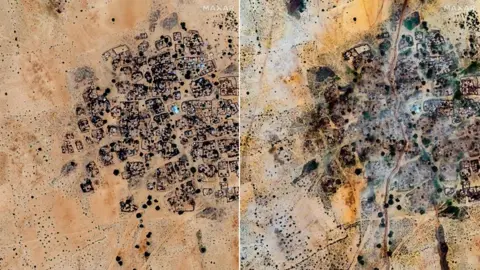In a significant escalation of conflict in southern Syria, clashes between Druze militias and Sunni Bedouin tribal fighters have resulted in the deaths of at least 30 individuals. The violence erupted in the predominantly Druze city of Suweida following the reported abduction of a Druze merchant, exacerbating longstanding sectarian tensions. The interior ministry of Syria characterized the situation as a "dangerous escalation" and announced that security forces were being mobilized to restore order.
The current conflict emerges against the backdrop of ongoing sectarian violence that has intensified since a major shift in power dynamics after the fall of President Bashar al-Assad. Druze communities, a minority sect derived from Shia Islam with distinct religious practices, have raised alarm regarding their safety amidst alleged failures by the new authorities to provide adequate protection.
Details of the clashes reveal that hostilities commenced in the al-Maqwas neighborhood of Suweida, initially involving armed Druze fighters encircling and overpowering Bedouin factions. The hostilities quickly radiated to the surrounding areas, leading to assaults on Druze settlements and widespread destruction, including shelling and arson. The Syrian Observatory for Human Rights reported that at least 37 casualties occurred, comprising 27 Druze—including two children—and 10 Bedouins.
The Syrian government attributed the rise in violence to the absence of effective governance and warned that the chaos undermined the community’s ability to manage conflicts. In response, they pledged coordinated intervention alongside defense forces to quell the violence.
Local officials, including the governor of Suweida, have urged residents to practice restraint and heed calls for reform. Additionally, representatives from both Druze and Bedouin factions have engaged in negotiations in attempts to mitigate tensions, resulting in the release of several individuals who were kidnapped amid the violence.
Despite efforts to de-escalate, renewed fighting erupted the following day as drone strikes targeted villages in Suweida, coinciding with the deployment of government troops in a nearby region. This episode mirrors previous conflicts, such as those observed in early May, when over 130 individuals lost their lives in clashes between Druze forces, security personnel, and Sunni Islamist fighters surrounding the capital and Suweida. In response to ongoing violence, the Syrian government has made agreements to engage local Druze militias in security operations.
The deteriorating situation emphasizes the fragile state of security in Syria and raises concerns about the potential for wider sectarian unrest that could engulf various minority communities amid the ongoing turmoil.
The current conflict emerges against the backdrop of ongoing sectarian violence that has intensified since a major shift in power dynamics after the fall of President Bashar al-Assad. Druze communities, a minority sect derived from Shia Islam with distinct religious practices, have raised alarm regarding their safety amidst alleged failures by the new authorities to provide adequate protection.
Details of the clashes reveal that hostilities commenced in the al-Maqwas neighborhood of Suweida, initially involving armed Druze fighters encircling and overpowering Bedouin factions. The hostilities quickly radiated to the surrounding areas, leading to assaults on Druze settlements and widespread destruction, including shelling and arson. The Syrian Observatory for Human Rights reported that at least 37 casualties occurred, comprising 27 Druze—including two children—and 10 Bedouins.
The Syrian government attributed the rise in violence to the absence of effective governance and warned that the chaos undermined the community’s ability to manage conflicts. In response, they pledged coordinated intervention alongside defense forces to quell the violence.
Local officials, including the governor of Suweida, have urged residents to practice restraint and heed calls for reform. Additionally, representatives from both Druze and Bedouin factions have engaged in negotiations in attempts to mitigate tensions, resulting in the release of several individuals who were kidnapped amid the violence.
Despite efforts to de-escalate, renewed fighting erupted the following day as drone strikes targeted villages in Suweida, coinciding with the deployment of government troops in a nearby region. This episode mirrors previous conflicts, such as those observed in early May, when over 130 individuals lost their lives in clashes between Druze forces, security personnel, and Sunni Islamist fighters surrounding the capital and Suweida. In response to ongoing violence, the Syrian government has made agreements to engage local Druze militias in security operations.
The deteriorating situation emphasizes the fragile state of security in Syria and raises concerns about the potential for wider sectarian unrest that could engulf various minority communities amid the ongoing turmoil.


















